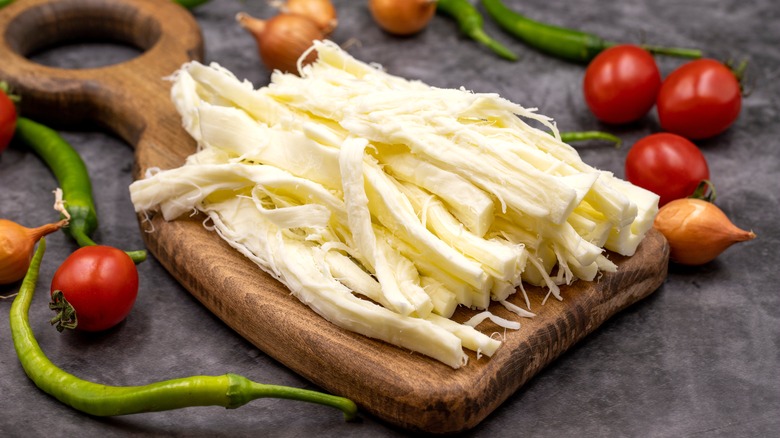When To Use Processed Mozzarella Cheese Over Fresh
If you think fresh mozzarella is always the best choice for your meal over the processed stuff you may have fallen victim to a common misconception. The word "processed" gets a bad wrap when it comes to food. Mostly associated with fast food, frozen dinners, and pre-packaged convenience, it has become known as not only for unhealthy, but low-quality. While that is not completely wrong, especially with ultra-processed food, it's not always the case. As Harvard Health notes, any food modified in any way from its natural state is considered processed, which can include such benign and even beneficial processes like pasteurization, blanching, and cutting.
That fear of processed food can lead to the automatic assumption that the fresh version of something is better. But as canned tomatoes prove, sometimes the processed alternative offers a lot of benefits, whether it's being preserved at peak flavor or retaining nutrients, and cheese is no different. Modified through the addition of salt, or set aside to age, most of your favorite cheeses would be considered processed to begin with — even when made with raw ingredients.
Fresh mozzarella is one of the few exceptions: It's about as close to completely natural as cheese gets. Still, as good as it might be in a salad or eaten with some good olive oil, there are times when it doesn't quite cut it as an ingredient and you should be reaching for the processed version instead.
Processed mozzarella is better for melting
Processed mozzarella is also known as low-moisture — it's those blocks of cheese you're more likely to find next to the hunks of cheddar and pepper jack than the fancy international cheese section. But that low-moisture distinction is what makes it better for some applications than fresh. According to Kitchn, processed mozzarella is aged longer, which improves its shelf life and adds a stronger flavor than the creamier fresh version. The lower water content also means processed mozzarella melts far better than fresh, which tends to get soupy and rubbery — so it should be your choice almost anytime you're heating up your cheese.
That means the defining use of mozzarella, pizza, is better off with processed, not fresh. Your classic Neapolitan pie will use unprocessed, in line with Italians emphasis on fresh, local ingredients, but every other type of pizza will work better with low-moisture. It won't just melt better, but it will add a more powerful, salty flavor, and it won't release too much moisture and sog down the crust.
Fresh mozzarella is a truly amazing treat that we would never discourage you from eating with a hunk of crusty bread, but if a good slice of New York pizza isn't enough to convince you some processed things are better, nothing will.

